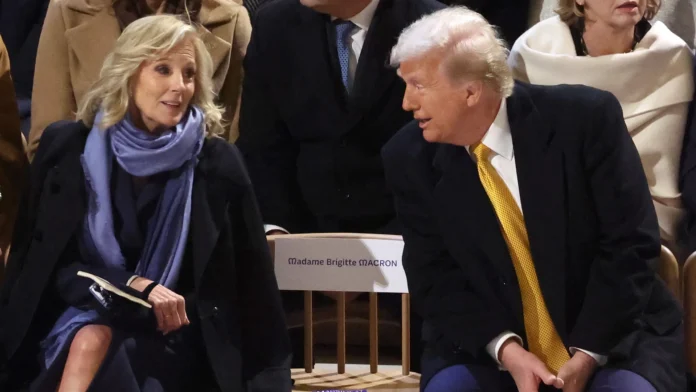In the grand theater of politics, where yesterday’s adversaries become today’s cordial acquaintances, the recent tête-à-tête between outgoing First Lady Jill Biden and President-elect Donald Trump at the reopening of Notre Dame Cathedral in Paris stands as a testament to the unpredictable nature of political relationships. This unexpected display of civility has left many observers both amused and bemused.
Historically, Jill Biden has not minced words when expressing her disdain for Trump. In March 2024, she labeled him a “bully” and “dangerous” to the LGBTQ community during a speech in Atlanta. (CNN) By May, her rhetoric intensified, summing up Trump with a single, withering word: “evil.” (Yahoo) Such pointed critiques made their recent amicable interaction all the more surprising.
Captured on camera, the encounter showed Jill Biden and Trump engaging in what appeared to be a friendly conversation, a scene that quickly ignited social media. Some internet commentators humorously speculated that Jill Biden might have supported Trump in the 2024 election, despite her past criticisms. (New York Post). This theory was further fueled by previous instances, such as Jill Biden wearing a Trump hat in September and donning a bright red outfit on Election Day.
When asked about the exchange, Trump remarked, “Very nice. She couldn’t have been nicer,” adding, “It’s politics. You have to get used to it.” (New York Post). This uncharacteristic warmth between the two has led some to wonder if the political arena is more about performance than genuine animosity.
The setting of their meeting, the newly restored Notre Dame Cathedral, added a layer of irony to the occasion. Just as the cathedral rose from the ashes of its 2019 fire, so too did this interaction suggest a possible rebuilding of bridges, however temporary, between political foes. Yet, given the volatile nature of politics, one must question whether this moment of civility is a genuine thawing of relations or merely a fleeting truce in the ongoing battle of partisan politics.
In the end, this encounter serves as a reminder that in politics, as in life, today’s adversaries can become tomorrow’s allies—or at least share a polite conversation in a historic cathedral.




